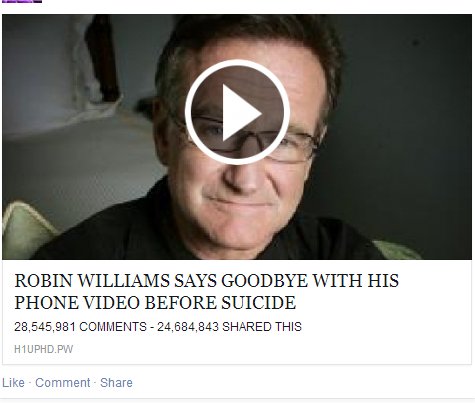Robin Williams video scam hits Facebook
Posted by: Jon Ben-Mayor on 08/18/2014 08:38 AM
[
 Comments
]
Comments
]
This scam has been passed around since the news of Robin Williams death hit the media - I wasn't going to post anything on it until I saw several of my own relatives publicly share it. It turns out the one my relative received was a Pepsi Vs. Coke survey.
Users that click on the link to the supposed video are taken to a fake BBC News website. As with many social scams, users are required to perform actions before they can view the content. In this case, users are instructed to share the video on Facebook before watching.

If a user clicks on the “Share on Facebook” button, they are prompted with a share dialog box. This box misleads users into believing this page has received millions of comments and shares but, actually, scammers have leveraged Facebook Open Graph metadata as a trick.
You never get to view any video, but you have helped the scammer and they truly thank you. The goal is to spread the scam across Facebook and using a highly publicized tragedy or current event is the best hook.
Symantec has alerted Facebook about this scam campaign and they are taking steps to block the offending URLs.
Be suspicious of these type of posts that (always) seem to pop up after a widely publicized event - if you are taken in by a scam - report it and then remove the post from your page before someone else falls victim.
Users that click on the link to the supposed video are taken to a fake BBC News website. As with many social scams, users are required to perform actions before they can view the content. In this case, users are instructed to share the video on Facebook before watching.

If a user clicks on the “Share on Facebook” button, they are prompted with a share dialog box. This box misleads users into believing this page has received millions of comments and shares but, actually, scammers have leveraged Facebook Open Graph metadata as a trick.
You never get to view any video, but you have helped the scammer and they truly thank you. The goal is to spread the scam across Facebook and using a highly publicized tragedy or current event is the best hook.
Symantec has alerted Facebook about this scam campaign and they are taking steps to block the offending URLs.
Be suspicious of these type of posts that (always) seem to pop up after a widely publicized event - if you are taken in by a scam - report it and then remove the post from your page before someone else falls victim.
Comments






